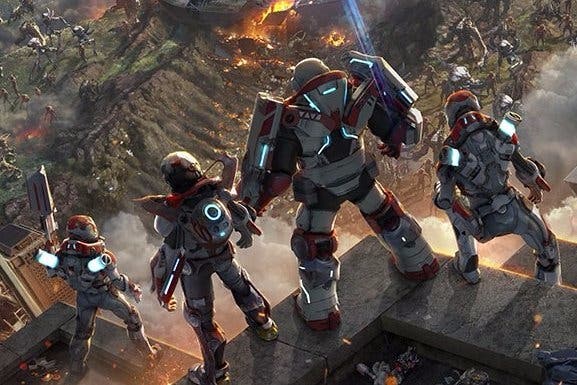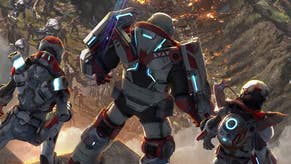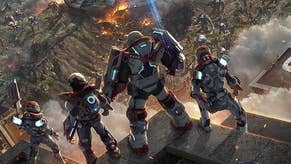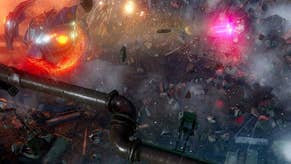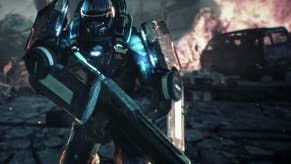Alienation review
The X-plosion files.
"Multiplier up." That voice! That perfect Housemarque voice, so calm in the face of chaos, so endlessly assured. In Resogun, she spoke to you through your controller - a wonderful piece of release-window magic that did more to make the PS4 feel exciting and new than almost anything else in the early line-up. In Alienation, she's back, bringing a hint of order to the manic battlefield of this relentless twin-stick shooter, and suggesting that, no matter how bad things seem right now, there is always the chance of a little showboating.
And things seem quite bad right now, to be honest. Earth has been invaded, and huge chunks of the planet are no-go zones, home to shambling, hulking, bubbling aliens. If you wondered what XCOM might feel like as a co-op blaster, this is probably it, the wide top-down-ish angle offering a decent view of a world that seems long past saving, while you and up to three friends (online only for now) pile into Chernobyl, Brazilian jungles, the frozen wastes of Alaska and beyond - how many other video games have room for Nebraska on the itinerary? - in a last ditch mission to save the remains of humanity.
Simple as the story is, the set-up makes a surprising amount of difference to the final game. Alienation is the sci-fi sister to Housemarque's much-loved zombie-athon Dead Nation, and while both play very similarly, they feel rather different. Dead Nation could come off as a bit of a slog, carefully crafted as it was, just because it was you against all those zombies, and you were surviving from one mission to the next, scraping by between horrific set-pieces. Alienation's ETs still feel a lot like the undead - staggering after you, limbs flailing, mutant bodies covered with odd lumps and bumps - but the framework offers players just a little more control. You're dropped in and lifted out of each level by chopper, and as you dart around the world, the growing sense that you're guerillas sticking it to the aliens blends well with the way that your powers evolve and your arsenal expands.
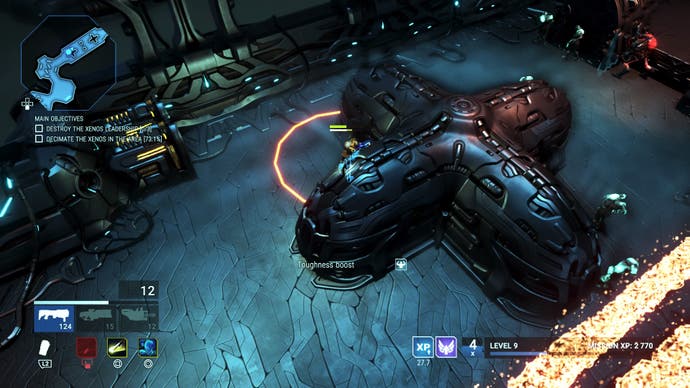
There are three different classes to get to grips with, and they each have their own tricks to master and evolve as you level up. There's a tank, who shields allies, smashes the ground, and can build up energy and then release it in a massive blast. There's a bio-specialist, who heals, releases nasty nano-clouds and can leave poison trailing in your wake. I spent most of my time as a saboteur, as I was curious to see how a stealthy character fits into a game that's about shooting everything in sight. The answer? It fits fine, it just doesn't feel very stealthy. You can fire up a limited burst of invisibility to get out of danger, but otherwise it's business as usual: a powerful melee option, a double-dash for creating extra space (all the characters come with their own spin on a dash move), and a wonderfully implemented smart bomb that drops in aerial bombardments as you paint nearby enemies with an expanding reticule.
All of these talents can be levelled up and tweaked as you work your way through the game - my saboteur ended things with a decent health recharge and a melee that sent even the biggest foe cartwheeling. On top of that, each class has three weapon slots - a primary, a secondary and a heavy - and these can be swapped in and out as you pick up randomly-generated loot from crates and fallen enemies. Housemarque excels at this stuff, so you know that any flamethrower you pick up is going to sizzle and sear, and that even the most underpowered shotgun will blast enemies into the sky like a holy hairdryer. The base weapon is often just the start, too. You can scrap unwanted kit for salvage, which you can use to reroll stats of favoured guns. You can also deck out weapons by adding cores to them. Think of these as sockets and gems, basically, with different kinds of cores boosting different central stats and sometimes unlocking new abilities. As for collecting the cores themselves? You guessed it, crates and fallen enemies.
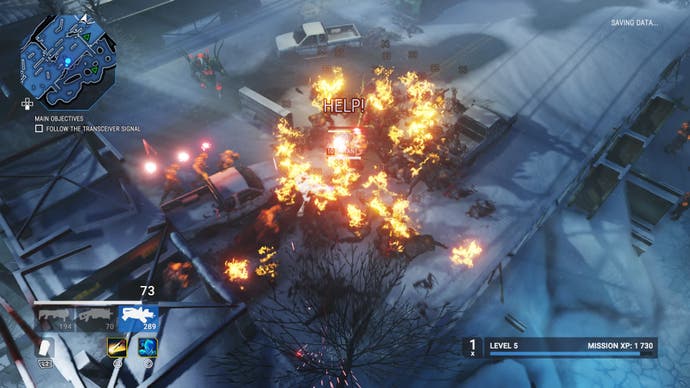
Neat as all this is - alongside the main game you can replay missions on different difficulty settings to get better drops, grind all your way to level 30 and the hero levels that stack beyond, and explore a range of secrets that kick in once you've completed the campaign for the first time - everything drives you back to the action on the ground. Again, Housemarque knows exactly what it's doing here. Each level initially feels like a scrum as you ping between simple objectives, lighting up respawn beacons and looting everything in sight, but as the enemies pile up, the tactics start to expand. The first thing to learn: which enemies go out with a bang, as they will take anyone nearby with them. Next, get used to the recharge rate on your grenades, since it allows you to keep the big guys - the snipers, flamers, and really heavy-hitters - at a distance. Learn when to dash. Learn when to conserve your dash energy.
You can hack your way through most of the game, relying on team-mate revives or endless respawns, but towards the end of the campaign, Alienation sweeps a lot of your crutches away and you have to get through a massive boss-ridden level that doesn't allow you to come back from the dead as easily. With failure looming close, Alienation suddenly forces you to engage with its full tactical depths as you juggle ammo clips, skill recharge rates and the enemies you're up against. It's a beautiful thing to behold: the order that lurks behind every Housemarque game shining clearly through the carnage.
It makes for a thrilling twin-stick shooter, alone or with friends, and it also bodes well for the fabled Housemarque/Eugene Jarvis collaboration. Here is a game about chaos, for the most part, but strung through it is the same kind of thinking that made Resogun's precision waves such a delight to pit yourself against. It's carnage, but it's as beautifully balanced as it is relentless.
